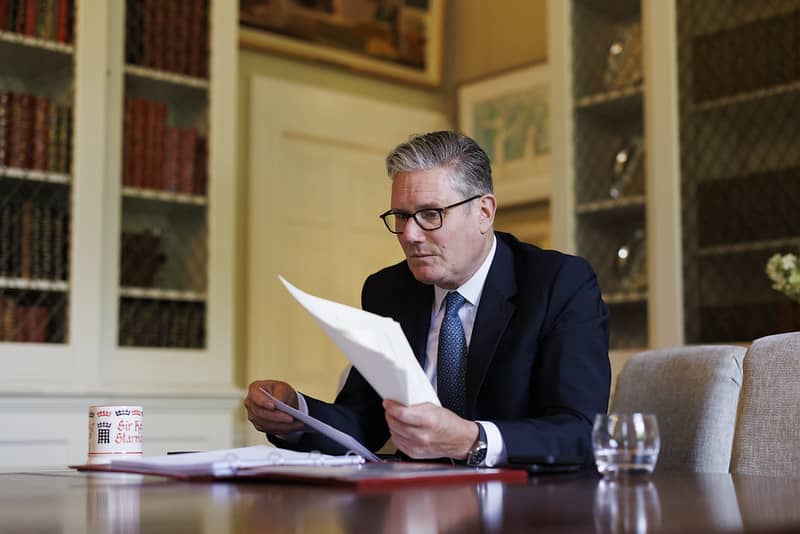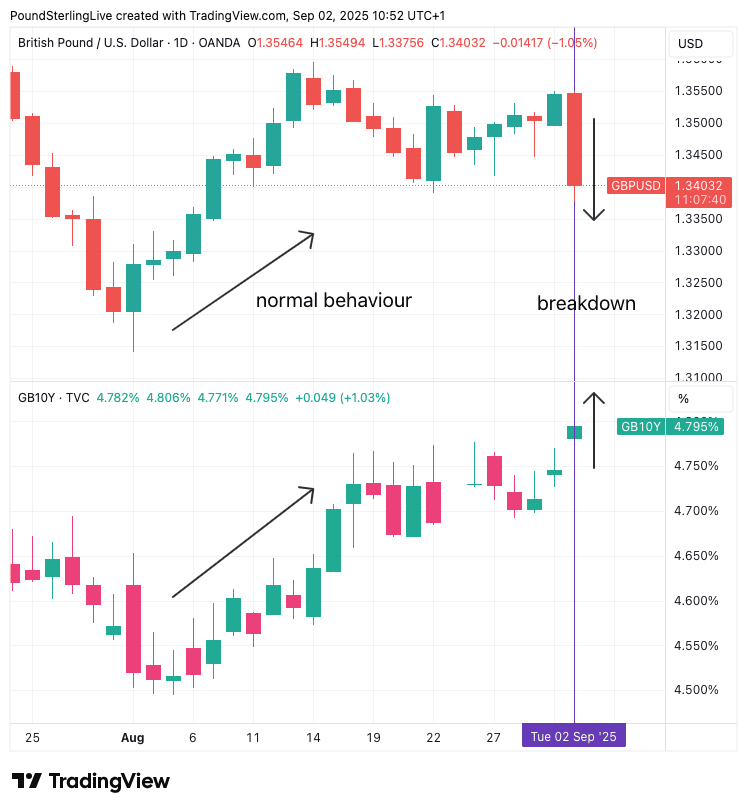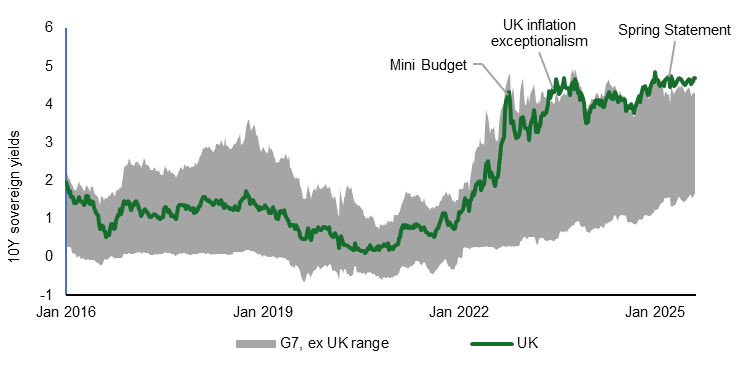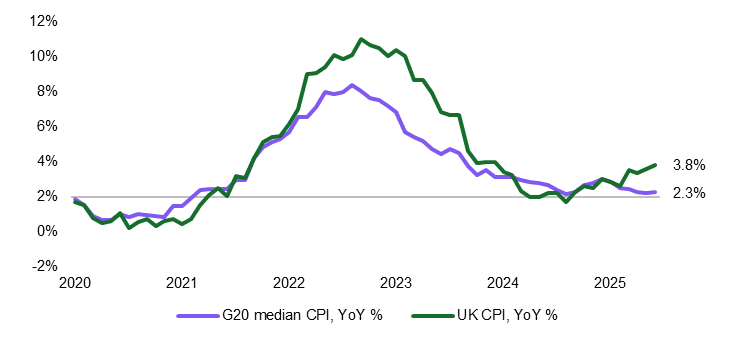
Prime Minister Keir Starmer announces the promotion of high-tax ideologues in his Downing Street team on Monday. Picture by Simon Dawson / No 10 Downing Street.
The UK leads the global bond rout.
The British Pound is under pressure amid a global rout of government bonds, which the UK leads.
Long-dated government bonds, which governments issue to raise debt, fell notably through the Tuesday session, amidst a combination of idiosyncratic and deep-seated structural headwinds.
The UK government's 30-year bond leads the falls, with the all-important 10-year not far behind, signalling concerns that the UK is issuing too much debt at a time of elevated inflation.
David Zahn, Head of European Fixed Income at Franklin Templeton, says the UK market is the most vulnerable to any increase in spending given its tough fiscal situation.
As government bonds fall, so too does the pound. "The 2025/26 sterling collapse has started!" says Andrew Sentance, independent economist and former Bank of England Monetary Policy Committee member.
The Pound to Euro exchange rate dropped half a per cent on the day to close at 1.1490, and extends losses into the midweek session to 1.1480. Those with transfer budgets at risk should secure today's rate to lock in a portion of their exposure for peace of mind.
The Pound to Dollar exchange rate slid by more than a per cent on the day to go to 1.34, extending to 1.3366 through Wednesday's session.
As demand for UK goverment bonds - also known as gilts - falls, so the interest rate those bonds pay rises; after all, investors want greater compensation for holding something that is seen as increasingly risky! The interest rate on a bond is known as its yield, and it signals that the government is having to spend more and more to service its debt.
Rising bond yields come as the government is already spending more than £100 billion a year servicing the national debt, which is more than the defence, education and home office budgets combined.
The rising debt bill, rising domestic inflation and disappointing economic growth leave the government with a £50BN black hole to fill in the upcoming budget, meaning tax rises and spending cuts are necessary.

Above: Rising bond yields usually support the pound. However, in times of fear, the opposite happens, and we saw such an episode kick off on Tuesday.
However, Number 10 Downing Street on Tuesday said the Budget won't be before mid-November at the earliest.
The ipaper's Hugo Gye reports HM Treasury has not yet given the OBR the ten-week notice period that it needs to prepare an updated economic and fiscal forecast, meaning businesses and households will have to speculate as to what uncomfortable adjustments await.
This uncertainty is in itself likely to weigh on economic activity and the pound.
"If Starmer thought his 'reshuffle' would settle the markets, he will have been disappointed. Bond yields up, sterling down and the autumn budget likely to be delayed to late November. Two and a half months of uncertainty and speculation awaits over this autumn!" says Sentance.
Sentance has previously warned that the UK's surging debt and low growth leaves the country facing a 1970s-style sterling crisis.
Above: UK is an outlier because its inflation rate is rising while it settles elsewhere. Image courtesy of Panmure Liberum.
In recognition of the less-than-optimal first year in power, Prime Minister Keir Starmer started the new parliamentary session on Monday by elevating a number of names in his government, signalling an intent to plug a £50BN budget black hole with tax rises.
"The immediate market reaction is not exactly a vote of confidence on these moves," says Simon French, Chief Economist & Head of Research at Panmure Liberum. "Markets are seeing it as a signal of more Gilt issuance/inflation to come."
Included in the reset is the appointment of Minouche Shafik as Chief Economic Adviser. She was co-chair of The Economy 2030 Inquiry at the Resolution Foundation, which spawned the Foundations' Economy 2030 report.
The report called for "Better, not just higher, taxes".
"A rising tax burden should not just fall on earnings, but should be shouldered by other sources of income and wealth," said the report. "Higher taxes are needed to raise investment."
The report recommends raising taxes on landlords, higher-earning self-employed, dividends, pensions, inheritances, and EV drivers, alongside structural reforms to Council Tax, non-dom rules, and Capital Gains Tax at death. It also proposes broadening VAT by lowering the registration threshold.
Torsten Bell was the Chief Executive of the Resolution Foundation when it delivered the Economy 2030 report. Chancellor Rachel Reeves has appointed him to take the lead on drafting the November budget.
The ideology of the team at the heart of government is therefore very much aligned with higher taxes.
"The autumn statement will probably be more of the same, with small tax rises that don't break the government’s manifesto, says Franklin Templeton's Zahn.

UK bond yields indicate the wrong kind of UK exceptionalism. Image courtesy of Simon French @ Panmure Liberum.
"I don’t think they believe that this is actually going to fix it by trying to put these band aids on it. We need to see a more radical cut in spending and a broader tax increase to bring the budget into balance, and if that doesn't happen, the bond market will continue to go higher," he warns.
More of the same for bond markets spells more of the same for the Pound, suggesting a spell of extended weakness awaits.
"Starmer's reorganisation of his No.10 team is like reshuffling the deckchairs on the Titanic. His focus is on trying to improve the presentation and communication of policy, when policy itself needs to change to head off a major crisis," says Sentance.
Looking ahead to November's budget, here are some of the taxes the Economy 2030 report advocates. With the report's architects firmly ensconced in Downing Street, we can get a sense of where we are headed:

